- Home
- Tad Williams
Shadowmarch Page 5
Shadowmarch Read online
Page 5
The fox hides her children.
—from The Bonefall Oracles.
This was one of Vansen’s favorite spots, high on the old wall just beneath the rough, dark stone of Wolfstooth Spire, and also one of the most satisfying things about his given task: he had good reason to be up here in the stiff breeze that flew across Brenn’s Bay, with nearly all of Southmarch, castle and town, arranged beneath him in the autumn sun like objects on a lady’s table. Was it shameful that he enjoyed it so?
When he was a child in the dales, Ferras Vansen and the boys from the next croft had liked to play King on the Hill, each trying to hold a singular place at the top of some hummock of soil and stone they had chosen for their battleground, but even in those instants when the others had gone tumbling down to the bottom and Ferras had stood by himself, master of the high place, still the foothills had loomed over them all, and beyond those hills the northern mountains themselves, achingly high, as if to remind young Ferras even in triumph of his true place in life. When he had grown older, he had learned to love those heights, at least those he could reach; at times he had purposely let the sheep wander off, trading one of his father’s sometimes violent punishments for the pleasure of following the straying herd into the high places. Until his manhood, he knew no greater pleasure than a stretch of afternoon when he could clamber up to one of the crests and look out over the folds of hillock and valley that lay before him like a bunched blanket—deep, dark places and airy prominences that no one else in his family had ever seen, although they lay less than a mile from the family croft.
Vansen sometimes wondered if this hunger for height and solitude the gods had put in him might not be stronger now than ever, especially with the much greater number of people around him in Southmarch, swarms of them filling the castle and town like bees in a hive. Did any of them, noble or peddler, soldier or serf, ever look up as he did and wonder at the loftiness of Wblfstooth Spire, a black scepter-shape that loomed over even the castle’s other towers as the distant snowcapped mountains had dominated the hills of his boyhood country? Did any of the other guardsmen marvel at the sheer size of the place as they walked the walls, these two great uneven rings of stone that crowned Midlan’s Mount? Was he the only one secretly thrilled by the liveliness of the place, the people and animals streaming in and out through the gates from sunup until sundown, and by its grandeur, the antique splendor of the king’s hall and the massive residence whose roofs seemed to have as many chimneys as a forest had trees? If not, Ferras Vansen couldn’t understand it: how could you spend every day beneath the splendid season-towers, each of the four a different shape and color, and not stop to stare at them?
Perhaps,Vansen considered, it was different if you were born in the midst of such things. Perhaps. He had come here half a dozen years ago and still could not begin to grow used to the size and liveliness of the place. People had told him that Southmarch was as nothing compared to Tessis in Syan or the sprawling, ancient city-state of Hierosol with its two-score gates, but here were riches to spare for a young man from dark, lonely Daler’s Troth, where earth and sky were both oppressively wet most of the time and in winter the sun seemed scarcely to top the hills.
As if summoned by chill memory, the wind changed, bringing needles of cold air from the ocean that pierced even Vansen s mail shirt and surcoat. He pulled his heavy watch-cloak more tightly around him, forced himself to move. He had work to do. Just because the royal family and, it seemed, half the nobles in the March Kingdoms were across the water hunting in the northern hills did not mean he could afford to spend the afternoon lost in useless thought.
That was his curse, after all, or at least so his mother had once told him: “You dream too much, child Our kind, we make our way with strong backs and dosed mouths “ Strange, because the tales she had told to him and his sisters in the long evenings, as the single small fire burned down, had always been about clever young men defeating cruel giants or witches and winning the king’s daughter. But in the light of day she had instructed her children, “You will make the gods angry if you ask for too much.”
His Vuttish father had been more understanding, at least sometimes. “Remember, I had to come far to find you,” he liked to tell Vansen’s mother. “Far from those cold, windy rocks in the middle of the sea to this fine place. Sometimes a man must reach out for more.”
The younger Ferras hadn’t completely agreed with the old man, certainly not about the place itself-—their croft in the hills’ dank green shadows, where water seemed to drip from the trees more than half the year, was to him a place to be escaped instead of a destination—but it was nice to hear his father, a onetime sailor who by habit or blood was a man of very few words, talk of something other than a chore young Ferras had forgotten to do.
And now it seemed Vansen had at last proved his mother wrong, for he had come to the city with nothing, and yet here he was, captain of the Southmarch royal guard, with the north’s greatest stronghold spread before him and the safety of its ruling family his responsibility. Anyone would be proud of such an achievement, even men born to a much higher station.
But in his heart Ferras Vansen knew his mother had been right. He still dreamed too much, and—what was worse and far more shameful—he dreamed of the wrong things.
“He’s like a hawk, that one,” a soldier at the residence guardhouse said quietly to his companion as Vansen walked away, but not so quietly that Vansen didn’t hear. “You don’t ever want to rest for a moment because he’ll just drop down on you, sudden-like.” Vansen hadn’t even punished them when he found them with their armor off, playing dice, but he had made his anger bitingly clear.
Vansen turned back. The two guardsmen looked up, guilty and resentful. “Next time it might be Lord Brone instead of me, and you might be on your way to the stronghold in chains. Think about that, my lads.” There was no whispering this time when he went out.
“They can like you or they can fear you,” his old captain Donal Murray had always said, and even in his last years Murroy had not hesitated to use his knobby knuckles or the flat of his hand to reinforce that fear in a soldier who was insolent or just too slow in his obedience Vansen had hoped when he was promoted to Murray’s place that he could substitute respect for fear, but after nearly a year he was beginning to think the old Connordman had been right. Most of the guards were too young to have known anything except peace. They found it hard to believe that a day might come when stealing a nap on duty or wandering away from their posts might have fatal consequences for themselves or the people they protected.
Sometimes it was hard for Vansen himself to believe it. There were days here on the edge of the world, in a little kingdom bounded by misty, ill-omened mountains in the north and the ocean almost everywhere else, where it seemed like nothing would ever change but the wind and weather, and those would only be the familiar small changes—from wet to slightly less wet and then back to wet again, from swirling breeze to stiff gale—that so wearied the inhabitants of this small stone in the shallows of the sea.
Southmarch Castle was ringed by three walls the huge, smooth outwall of gray-white southern granite that circled the mount and whose foundations in many places were actually beneath the waters of Brenn’s Bay, a skirt of fitted stone which, along with the bay itself, made the little sometimes-lsland into what had been for centuries a fortress that could resist any siege, the New Wall, as it was called (though no one could remember a time before it had existed), that surrounded the royal keep and touched all the cardinal towers except the one named for summer, and the Old Wall that bounded the inmost heart of the keep, and within whose protective shadow lay the throne hall and the royal residence These two edifices were as riddled with hallways and chambers as anthills, so old and vast and beset by centuries of intermittent neglect that they both contained rooms and passages that had not been entered or even remembered for years.
The smaller buildings that surrounded them made the lower castle just as intricate a m
aze as the residence and throne hall, jumble of temples and shops, stables and houses, from the high-timbered mansions of the nobility nestled inside the Old Wall to the stacked hovels of those of less lofty station, piled so leaningly high that they turned the narrow streets between them into shadowy arbors of dark wood and plaster Most of the buildings of Southmarch had been connected over the years by a ramshackle aggregation of covered walkways and tunnels to protect the denizens from the wet northern weather and the often ruthless winds, so that sometimes all the castle’s disparate structures, built over generations, seemed to have fused together like the contents of one of the tide pools in the rocks at the ocean edge of Brenn’s Bay, where stone and plants and shells grew together into one semiliving—and no longer separable—mass.
Still, there was sun here, Ferras Vansen told himself, far more of it in a year than he had seen in his entire youth in the Dales, not to mention fresh winds off the sea. That made it all bearable, and more than bearable: there were times when just being in the place filled him with joy.
By the time the afternoon had begun to fade, Vansen had walked most of the uneven circle of the Old Wall, stopping at each guard post, even those that consisted of nothing more than a lonely soldier with a pike standing before a locked door or gate and trying not to doze. Drunk on sea air and some rare time to pursue his own thoughts without the distractions of command, Vansen briefly considered a course around the much lengthier New Wall, but a look at the harbor and the sails of the newly arrived carrack from Hierosol reminded him that he could not afford the time. There would be a hundred tasks before the end of the day; the visitors must be safely lodged, guarded, and watched, and Avin Brone, the lord constable, would expect Vansen to take charge of the task himself. The ship had four masts—a good-sized vessel, which meant that the envoy might have come with a sizable bodyguard.Vansen cursed quietly. More than one day’s pleasurable solitude was going to be sacrificed to this ship and its passengers. He would have to keep his men and the southerners apart as much as possible. With King Olin a captive of Hierosol’s Ludis Drakava, there was much bad blood between the Hierosolines and the Southmarch folk.
When he came out of the small guard tower by the West Green, he was distracted from his planning by the sight of someone else on the walls, a cloaked and hooded figure that seemed slight enough to be a woman or a young boy. For an illogical moment he wondered if it could be her, the one he dared not think of too often. Had fate somehow brought her here alone to this place where they could not help but speak? The thought of all the things he might say to her, careful, respectful, sincere, passed through his mind in a heartbeat before he realized that it could not be her, that she was still out with the others hunting in the hills.
As though this swirl of confused thoughts made a sound as audible and frightening as a swarm of hornets, the hooded figure suddenly seemed to notice him; it immediately stepped down from the wall into the stairwell and disappeared from his sight. By the time Vansen reached the stairs he could not discern that particular dark, hooded cloak in the throng of people in the narrow streets below the wall.
So I am not the only one who likes the view from high places, he thought. He felt a pang; it took him a moment to realize, to his surprise, that it was loneliness.
“You’re too much inside yourself, Vansen,” old Murroy had once told him. “You think more than you talk, but that’s little use when the others can see so plainly what you’re thinkin’. They know that you think well of yourself, and often not so well of them. The older men in particular, Laybrick and Southstead, don’t like it.”
“I do not like men who . . . who take advantage,” Vansen had answered, trying to explain what was in his heart but not quite having the words. “I do not like men who take what the gods give and pretend it’s their due.”
Hearing that, Murroy’s leathery old face had creased in one of his infrequent smiles. “Then you must not like most men.”
Ferras Vansen had wondered ever since whether his captain’s words were true. He liked Captain Murroy himself slightly more than he feared him, or at least he liked the man’s brutal evenhandedness, his unwillingness to complain, his occasional flashes of sour humor. Donal Murroy was staying that way to the end: even as the wasting sickness stole his life, he offered no complaint against fate or the gods, saying only that he wished he had known what was going to happen so he could have given his wife’s lying, bragging younger brother a thrashing while he still had the strength. “As it is, I’ll have to leave it to the next man whose hospitality or good sense he offends. I hope it’s someone who has the time to beat him within a hair of his useless life.”
Vansen marveled at how the older man could laugh despite the racking cough and the blood on his lips and stubbled chin, how his shadowed, deep-sunken eyes were still as bright and heartlessly fierce as a hunting bird’s.
“You’ll follow me as guard captain, Vansen,” said the dying man. “I’ve told Brone. Himself has no powerful objections, though he thinks you a bit young. The great man’s right, of course, but I wouldn’t trust that ass Dyer with the bung from an empty cask and all the older men are too fat and lazy. No, it’s you, Vansen. Go ahead and muck things up if you want to. They’ll just come and put flowers on my grave and miss me.” Another laugh, another spray of red-tinged spittle.
“Thank you, sir.”
“Don’t bother, lad If you do it right, you’ll spend all your life working at it with no more payment than a little land to build a house and p’raps a spot in a proper graveyard at the end of it instead of the potter’s field “ He wiped his chin with a gnarled hand. “Which reminds me—don’t let them forget there’s a place set aside for me in the guards’ cemetery. I don’t want to end up out in the western hills somewhere, but I don’t want Mickael Southstead pissing on my grave, either, so you keep an eye on me after I’m gone.”
He hadn’t cried when the captain died, but he sometimes felt as if he wanted to when he thought about him now. The captain’s manner of going had been much like that of Ferras’ own father, now that he thought on it. He hadn’t cried for Pedar Vansen either, and hadn’t been to his father’s grave in the old temple yard at Little Stell for years, but that wasn’t really so surprising. Vansen’s sisters, what was left of the crofter’s family, were all in Southmarch-town now, settled with husbands and children of their own. Daler’s Troth was several days’ ride away in the hills to the west. His life was here now, in this dizzyingly large and crowded citadel.
He made his way around to the western tower of the Raven’s Gate. The men in the guardhouse there had a well-stoked fire and he stopped to warm his hands before going to see what Lord Brone wanted done about the southerners. The easy chatter had fallen off when he had come in, as usual, and all the men were standing around in awkward silence except for Collum Dyer, the officer in charge, closest thing to a friend Ferras Vansen had. He dreaded the day he would have to draw that line Murroy had talked of so often, and discipline Dyer for something—whatever Dyer felt about Vansen was certainly not fear, and did not quite seem like respect either—because he was certain that would be the day that their friendship, slight as it was, would end.
“Been out wandering the walls, Captain?” Dyer asked him Vansen was grateful that Dyer at least named him by his rank in front of the men That was a small nod of respect, wasn’t it? “Any sign of invading forces?"
Vansen let himself smile. “No, and Perin be thanked for that, today and every day. But there is a Hierosoline ship in the harbor and there will be fighting men on board, so let us not take things too lightly, either.”
He left them and made his way down the stairs to the sloping road that led up to the Great Hall. The lord constable had his work chambers in the maze of corridors behind the throne room, and at this time of the day Vansen felt certain he would be there. As he walked up the road toward the vast carved facade, where the guards were already straightening at their young captain’s approach, he looked up at the high hall nestl
ed in the midst of the Mount’s towers like a gem on a royal crown and felt a clutch of worry that something might change, that some error of his own or the whim of feckless gods might take all this away from him.
I am a fortunate man, he told himself. Heaven has smiled on me, far beyond what I have earned, and I have everything I could want—or nearly so. I must accept these great riches and not ask more, not anger the gods with my greed.
I am a fortunate man and I cannot, even in the foolishness of my secret heart, ever forget that.
3
Proper Blue Quartz
THE BIRD WHO IS A RIDDLE:
Beak of silver, bones of cold iron
Wings of setting sun
Claws that catch only emptiness
—from The Bonefall Oracles
The boy from behind the Shadowline stopped to stare at the castle’s jutting towers. The three of them were on the lower reaches of the hill road now, which wound down through rolling farmlands to the edge of the city on the shoreline. The heights of Midlan’s Mount were still distant across the causeway, Wolfstooth Spire looming above all like a dark claw scratching the belly of the sky. “What is that place?” the child asked, almost in a whisper. “Southmarch Castle,” Chert told him. “At least the part with the towers out on that rock in the middle of the bay—the bit on this side is the rest of the town. Yes, Southmarch . . . some call it Shadowmarch, did I already say that? On account of it’s so close to the . . .” He remembered where the boy came from and trailed off. “Or you can call it ‘The Beacon of the Marches,’ if you like poetry.”

 God Rest Ye Merry, Gentlepig
God Rest Ye Merry, Gentlepig Tailchaser's Song
Tailchaser's Song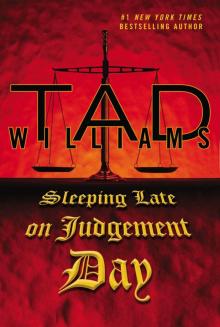 Sleeping Late on Judgement Day
Sleeping Late on Judgement Day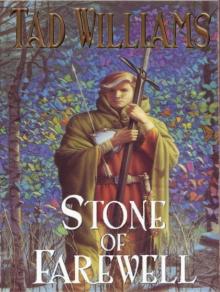 Stone of Farewell
Stone of Farewell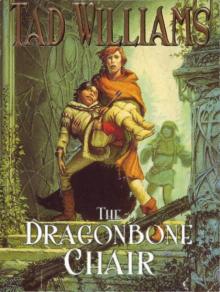 The Dragonbone Chair
The Dragonbone Chair Sea of Silver Light
Sea of Silver Light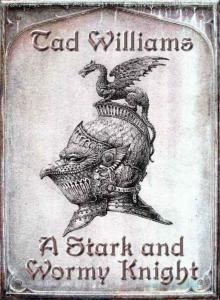 A Stark and Wormy Knight
A Stark and Wormy Knight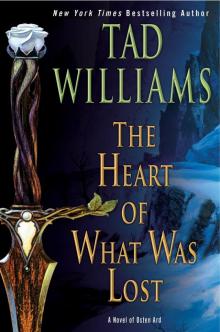 The Heart of What Was Lost
The Heart of What Was Lost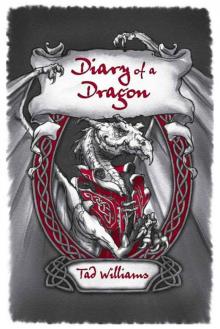 Diary of a Dragon
Diary of a Dragon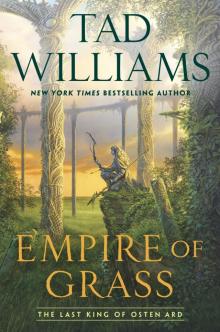 Last King of Osten Ard 02 - Empire of Grass
Last King of Osten Ard 02 - Empire of Grass To Green Angel Tower, Volume 1
To Green Angel Tower, Volume 1 The Dirty Streets of Heaven
The Dirty Streets of Heaven River of Blue Fire
River of Blue Fire The Very Best of Tad Williams
The Very Best of Tad Williams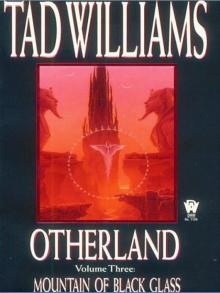 Mountain of Black Glass
Mountain of Black Glass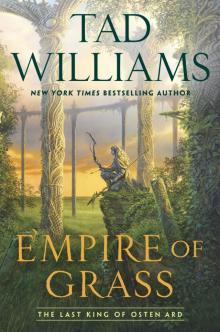 Empire of Grass
Empire of Grass City of Golden Shadow
City of Golden Shadow Happy Hour in Hell
Happy Hour in Hell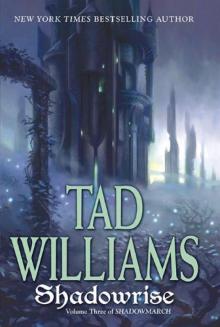 Shadowrise
Shadowrise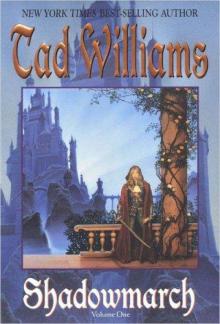 Shadowmarch
Shadowmarch Brothers of the Wind
Brothers of the Wind Shadowheart
Shadowheart Bobby Dollar 02 - Happy Hour In Hell
Bobby Dollar 02 - Happy Hour In Hell The War of the Flowers
The War of the Flowers The Dirty Streets of Heaven bd-1
The Dirty Streets of Heaven bd-1 Tad Williams - The War of the Flowers (retail) (pdf)
Tad Williams - The War of the Flowers (retail) (pdf) Shadowheart s-4
Shadowheart s-4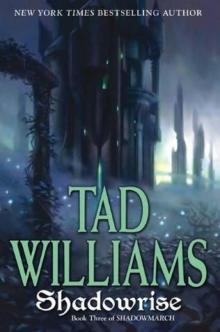 Shadowrise s-3
Shadowrise s-3 The Dirty Streets of Heaven: Volume One of Bobby Dollar
The Dirty Streets of Heaven: Volume One of Bobby Dollar The Stone of Farewell
The Stone of Farewell (Shadowmarch #1) Shadowmarch
(Shadowmarch #1) Shadowmarch The Secrets of Ordinary Farm of-2
The Secrets of Ordinary Farm of-2 Shadowmarch s-1
Shadowmarch s-1![Bobby Dollar [04] God Rest Ye Merry, Gentlepig Read online](http://i1.bookreadfree.com/i1/04/06/bobby_dollar_04_god_rest_ye_merry_gentlepig_preview.jpg) Bobby Dollar [04] God Rest Ye Merry, Gentlepig
Bobby Dollar [04] God Rest Ye Merry, Gentlepig Lightspeed Issue 33
Lightspeed Issue 33 Sea of Silver Light o-4
Sea of Silver Light o-4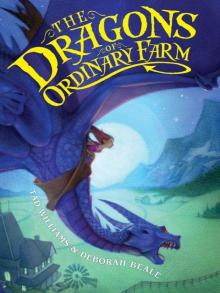 The Dragons of Ordinary Farm of-1
The Dragons of Ordinary Farm of-1 Shadowplay s-2
Shadowplay s-2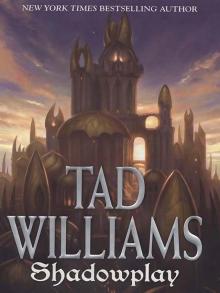 (Shadowmarch #2) Shadowplay
(Shadowmarch #2) Shadowplay